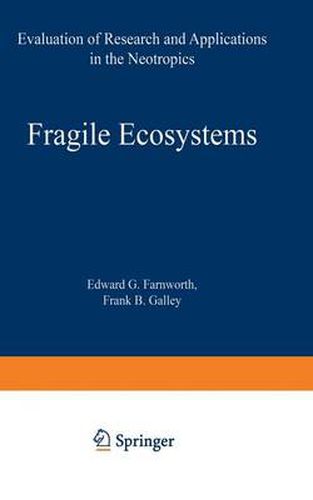Readings Newsletter
Become a Readings Member to make your shopping experience even easier.
Sign in or sign up for free!
You’re not far away from qualifying for FREE standard shipping within Australia
You’ve qualified for FREE standard shipping within Australia
The cart is loading…






This title is printed to order. This book may have been self-published. If so, we cannot guarantee the quality of the content. In the main most books will have gone through the editing process however some may not. We therefore suggest that you be aware of this before ordering this book. If in doubt check either the author or publisher’s details as we are unable to accept any returns unless they are faulty. Please contact us if you have any questions.
The Institute of Ecology (TIE) was organized to provide a mech anism for addressing ecological and environmental issues that were beyond the special interests of ecology as a profession. One method of evaluating such issues is the workshop, and this report describes the results of the third TIE workshop on a major environmental subject. The ecology of tropical regions is of interest to all the inhabitants of the biosphere. The tropics provide mankind with both the opportunity for and the challenge of essential resources, land for settlement and development, and waters for numerous uses. Moreover, they provide examples of misuse of the landscape, fragility of ecological systems, and serious environmental problems. Unfortunately, the study of the ecology of the tropics has not kept pace with the ecology of other regions. The purpose of this report, therefore, is to determine the research approaches that will lead to advances in our theoretical un derstanding of tropical systems and, more importantly, in the applica tion of that knowledge to human problems. Although the principal focus of the report is on the neotropics, it will be useful to the full spectrum of persons concerned with the tropics around the world government officials, sCientists, students of ecology, and others. TIE is especially pleased to thank the numerous scientists and ad ministrators who participated in the workshop and who contributed to this report. Arthur D.
$9.00 standard shipping within Australia
FREE standard shipping within Australia for orders over $100.00
Express & International shipping calculated at checkout
This title is printed to order. This book may have been self-published. If so, we cannot guarantee the quality of the content. In the main most books will have gone through the editing process however some may not. We therefore suggest that you be aware of this before ordering this book. If in doubt check either the author or publisher’s details as we are unable to accept any returns unless they are faulty. Please contact us if you have any questions.
The Institute of Ecology (TIE) was organized to provide a mech anism for addressing ecological and environmental issues that were beyond the special interests of ecology as a profession. One method of evaluating such issues is the workshop, and this report describes the results of the third TIE workshop on a major environmental subject. The ecology of tropical regions is of interest to all the inhabitants of the biosphere. The tropics provide mankind with both the opportunity for and the challenge of essential resources, land for settlement and development, and waters for numerous uses. Moreover, they provide examples of misuse of the landscape, fragility of ecological systems, and serious environmental problems. Unfortunately, the study of the ecology of the tropics has not kept pace with the ecology of other regions. The purpose of this report, therefore, is to determine the research approaches that will lead to advances in our theoretical un derstanding of tropical systems and, more importantly, in the applica tion of that knowledge to human problems. Although the principal focus of the report is on the neotropics, it will be useful to the full spectrum of persons concerned with the tropics around the world government officials, sCientists, students of ecology, and others. TIE is especially pleased to thank the numerous scientists and ad ministrators who participated in the workshop and who contributed to this report. Arthur D.